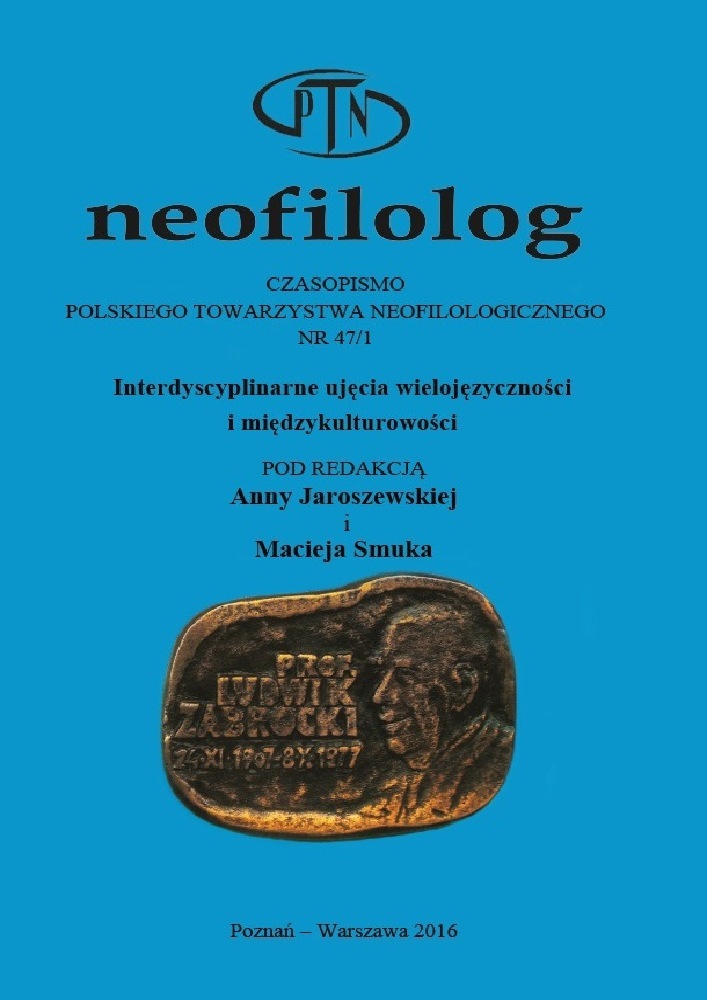Abstract
The purpose of this article is to present the learning foreign languages as an activity supporting the self-improvement and the development of creative competences. The article consists of three parts. The subject of the first part is an evolution of the concept of creativity, characteristics of the research paradigms of creativity and links between the self-improvement and the creative competences. The focus of the second part is neurobiological and intrapsychic basis for self-improvement and development of creative competences. The third part shows the benefits resulting from the activity of learning foreign languages in the context of self-improvement and development of creative competences.
References
Bertelle, L. 2011. „Dwujęzyczność w świetle najnowszych badań”. Lingwistyka stosowana, 4: 241-249.
Blachowska-Szmigiel, M. 2010. Twórcze schematy poznawcze a kreatywność językowa. Na przykładzie języka francuskiego jako obcego. Poznań: Wydawnictwo Naukowe UAM.
Blachowska-Szmigiel, M. 2011. „Développer la pensée convergente et divergente en cours de FLE”. (w) Études françaises dans la société du XXI siècle. Défis et perspectives. (red. E. Biardzka). Seria Prace naukowe Akademickiego Towarzystwa Romanistów Polskich „Plejada”. Łask: Oficyna Wydawnicza LEKSEM, str. 13-24.
Blachowska-Szmigiel, M. 2013. „Zadania zorientowane na ekspresję teatralną jako narzędzie wspierające rozwój kreatywności językowej studenta filologii romańskiej”. Neofilolog, 40/1: 29-41.
Blachowska-Szmigiel, M. 2014. „Le coaching trouvera-t-il sa place dans le développement des compétences créatives des enseignants du FLE en Pologne?” (w) Les innovations en des langues étrangères. (red. M. Blachowska-Szmigiel). Studia Romanica Posnaniensia XLI/3. Poznań: Wydawnictwo Naukowe UAM, str. 3-15.
Buffet, I.W. 2012. Acteur de sa vie. Développer l’empowerment. Mieux être au travail et dans sa vie personnelle. Paris: Mon Petit Editeur.
Chabrol, H. 2005. „Les mécanismes de défense”. Recherche en soins infirmiers, 2005/3 (82), 31-42.
Czopra D. i R.E. Tanzie. 2014. Twój supermózg. Warszawa: Wydawnictwo Ole.
Marsh, D. i R. Hill (red.) 2009. Étude sur la contribution du multilinguisme à la créativité. Rapport final. Bruxelles: Europublic sca/cva.
Hawkins, D.R. 2012. Przekraczanie poziomów świadomości. Schody do oświecenia. Warszawa: Wydawnictwo Virgo.
Karaś, A. i T. Knopika. 2005. „Postawa twórcza – źródło szczęścia czy kula u nogi? Rozmowa Agnieszki Karaś i Tomasza Knopika z prof. Andrzejem Sękowskim”. Zeszyty Szkolne 2005/1 (15): 8-13.
Kossut M. „Synapsy i plastyczność mózgu”. (w) Nauka światowa i polska, www.fundacjarozwojunauki.pl 285-306 DW 10.01.2016, str. 285-305.
Kozielecki, J. 2000. Koncepcje psychologiczne człowieka. Warszawa: Wydawnictwo Naukowe Żak.
Nęcka, E. 2001. Psychologia twórczości. Gdańsk: GWP.
Piesiak, W. 2013. „Genetyka i starzenie się mózgu”. (w) Sympozja II: Neurokognitywistyka w patologii i zdrowiu 2011-2013. Szczecin: Wydawnictwo Annales Academiae Medicae Stetinesis, str. 56-66.
Popek, S. 2003. Człowiek jako jednostka twórcza. Lublin: UMCS.
Popek, S. 2004. Kwestionariusz Twórczego Zachowania KANH. Lublin: UMCS.
Rychlewska-Suska, J. 2014. MA-URI dar życia i moc kreacji. Wewnętrzna podróż ku świadomemu poczęciu i życiu w wolności.
Tatarkiewicz, W. 1988. Dzieje sześciu pojęć. Warszawa. PWN.
License
Copyright (c) 2018 Marzena Blachowska-Szmigiel

This work is licensed under a Creative Commons Attribution-NoDerivatives 4.0 International License.
Authors
Authors of texts accepted for publication in Neofilolog are required to complete, sign and return to the Editorial team’s office the Agreement for granting a royalty-free license to works with a commitment to grant a CC sub-license.
Under the agreement, the authors of the texts published in Neofilolog grant Adam Mickiewicz University in Poznań a non-exclusive, royalty-free license and authorize the use of Attribution-NoDerivatives 4.0 International (CC BY-ND 4.0) Creative Commons sub-license.
The authors retain the right to the free disposal of the work.
Users
Interested Internet users are entitled to use works that have been published in Neofilolog since 2017, under the following conditions:
▪ attribution – obligation to provide, together with the distributed work, information about the authorship, title, source (link to the original work, DOI) and the license itself.
▪ no derivatives – the work must be preserved in its original form. Without the author's consent, it is not possible to distribute the modified work in the form of translations, publications, etc.
Copyrights are reserved for all texts published since 2017.
Miscellaneous
Adam Mickiewicz University in Poznań retains the property right as a whole (layout, graphic form, title, cover design, logo etc.).
